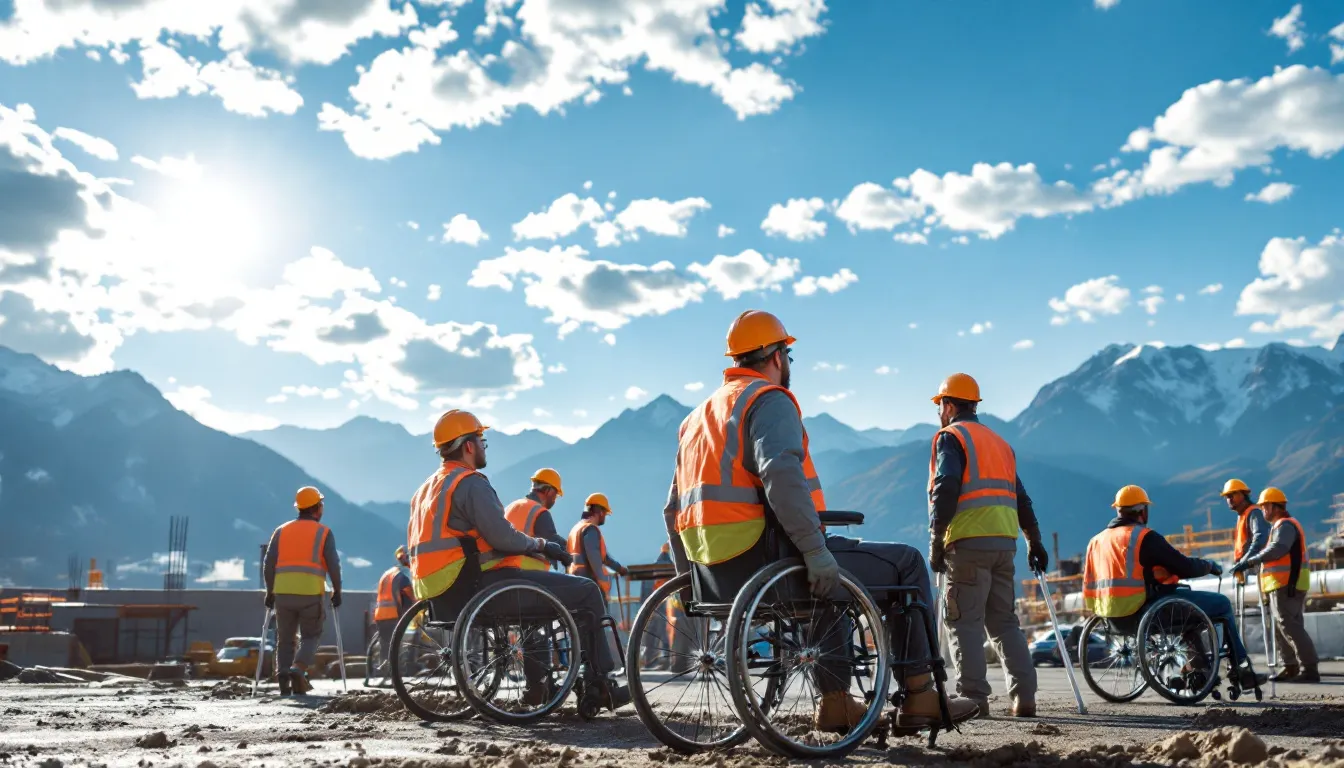Top Lakewood Workers Compensation Lawyer | Expert Work Injury Help
Are you injured at work in Lakewood and need help with your workers’ compensation claim? A Lakewood workers compensation lawyer can help you navigate the process and ensure you get the benefits you deserve. This article will walk you through understanding workers’ compensation, steps to take after an injury, dealing with insurance companies, and how legal help can aid your case.
Ready to speak with an experienced Lakewood workers compensation lawyer? Contact Steve Johnston today by calling (719) 309-9484 or reach out online to schedule your free consultation.
Key Takeaways
-
Workers’ compensation in Lakewood operates under a no-fault insurance model, offering essential benefits such as medical care and lost wages to injured workers, regardless of fault.
-
It is crucial for injured workers to notify their employer and seek medical attention promptly after an injury occurs to support their claims and ensure their rights are protected.
-
Legal representation is recommended when filing claims, negotiating with insurance companies, or appealing denied claims, as experienced attorneys can improve the chances of obtaining fair compensation.
Understanding Workers' Compensation in Lakewood

Workers’ compensation insurance is a vital safety net designed to provide benefits to employees who are injured or become ill due to their job duties. In Lakewood, the workers’ compensation system follows a no-fault insurance model, meaning that benefits are available to injured workers regardless of who caused the injury. Workers’ compensation is an employer-provided insurance program designed to protect employees injured on the job. This ensures that all employees have access to necessary medical care and financial support without needing to prove fault, including workers comp.
The benefits provided under workers’ compensation in Lakewood are comprehensive. They cover medical care, lost wages, and both temporary and permanent disability benefits resulting from workplace accidents or illnesses. This coverage aims to alleviate the financial burden on injured workers and help them focus on recovery and returning to work. If you need assistance, consider consulting Lakewood workers comp attorneys.
Workplace injuries can have significant impacts on a worker’s health, income, and long-term earning potential. Navigating the workers’ compensation system is vital for injured workers to successfully secure the benefits they deserve. Lakewood workers compensation attorneys have the local expertise to guide residents through the claims process and help secure benefits. This guide will walk you through each step of the process, from reporting an injury to dealing with insurance companies and understanding the benefits you can expect.
Types of Work-Related Injuries Covered
Work-related injuries come in various forms, and a work related injury can be covered by workers’ compensation, which is designed to cover a wide range of scenarios. Common types of injuries that are typically covered include:
-
Slips, trips, and falls, which can lead to muscle sprains, tears, and bone fractures
-
Injuries from lifting, bending, or twisting
-
Motor vehicle accidents while on the job, which can lead to serious injury results. A car accident that occurs during work-related driving is also covered under workers’ compensation, and legal claims may be necessary to secure benefits for injuries sustained in such incidents.
Repetitive strain injuries, such as carpal tunnel syndrome, are another category of work-related injuries that can develop over time due to lasting physical repetitive motions or prolonged periods of strain. These injuries may not be immediately apparent but can significantly impact an injured worker’s ability to perform their job duties.
Occupational diseases caused by long-term exposure to harmful substances are also eligible for workers’ compensation coverage. These diseases can include respiratory conditions, skin disorders, and other illnesses that develop as a result of the work environment. Knowing the types of injuries covered helps injured workers receive the appropriate benefits and support.
Steps to Take After a Workplace Injury
The moments following a workplace injury can be chaotic and stressful. However, promptly taking the right steps after an injury is key to protecting your rights and ensuring a successful workers’ compensation claim. The first step is to notify your employer of the injury within ten working days. This notification validates your claim and helps avoid potential denials due to late reporting.
The next critical step is seeking medical attention:
-
Inform the doctor that your injuries are work-related, which helps with documentation and prevents complications with your claim.
-
Proper medical care aids in recovery.
-
It provides crucial evidence to support your workers’ compensation claim, especially in cases of serious injury.
If you are dissatisfied with the care provided by your employer-assigned doctor or suspect bias, you have the right to change doctors to ensure proper recovery and advocate for your health needs.
It’s vital to document all necessary information and keep track of your medical records and the claims process. Accurate records will help protect your rights and ensure you have all the information needed to support your claim. These steps can significantly boost your chances of receiving fair compensation for your injuries.
Filing a Workers' Compensation Claim in Lakewood

Filing a workers’ compensation claim in Lakewood involves several critical steps. Initially, injured workers must report their injury to their employer within one year to retain their right to benefits. Delaying this report can weaken your lakewood workers comp claim, as insurance companies may argue that the injury is not work-related.
The workers’ compensation system can be complex, making legal assistance highly recommended. An experienced workers’ compensation attorney can guide you through the process, help you avoid common pitfalls, and ensure all necessary documentation is correctly submitted. Insurance adjusters may request recorded statements that could be used against you, making legal representation during these statements crucial. If you find yourself in need of assistance, consider reaching out to compensation lawyers for expert guidance.
Be cautious with your social media presence, as insurers often monitor posts that could contradict your claimed injuries. Returning to work before being cleared by a doctor can harm your claim and cause further injury.
Be wary of early settlement offers from insurance companies, as they often fail to cover your full medical treatment costs or future needs. Legal guidance can help you negotiate a fair settlement to ensure you receive benefits you deserve.
What to Expect from Workers' Compensation Benefits

Workers’ compensation benefits are designed to provide comprehensive support to injured workers. These workers comp benefits address a wide range of needs, starting with medical benefits for job-related injuries, which workers compensation typically includes, such as:
-
Doctor visits
-
Hospital stays
-
Surgeries
-
Any necessary medical treatments.
Medical bills related to workplace injuries are generally covered by workers’ compensation, so eligible medical costs are paid without out-of-pocket expenses for the injured worker.
Injured workers can also expect to receive temporary disability benefits, which provide partial wage replacement during the recovery period. These benefits typically begin after a waiting period of three to seven days and the wage replacement amount is typically about two thirds of the worker’s average weekly wage. Permanent disability benefits are available for those with long period or permanent injuries, which may lead to permanent impairment. These benefits include compensation for both total and temporary partial disability based on the severity of the impairment, including cases of temporary total disability, permanent total disability, permanent partial disability, and tpd benefits.
In tragic cases where a worker dies due to a workplace injury, death benefits cover funeral expenses and provide financial support to the dependents of the deceased. Knowledge of these benefits can help injured workers and their families navigate the recovery process and secure the support they need during a challenging time.
Dealing with Insurance Companies

Dealing with insurance companies can be one of the most challenging aspects of a workers’ compensation claim. A workers’ compensation attorney can significantly enhance your chances of a successful workers comp claim by ensuring all procedures are correctly followed and your rights are protected. Strict adherence to your insurance company’s workers comp claims submission procedures is crucial, as any deviations can invalidate your claim.
Gathering detailed information at the time of the workplace accident and maintaining a factual, professional demeanor in communications with insurers is essential. Misunderstandings or miscommunications can negatively impact your claim, so it’s often best to let your attorney handle negotiations with the insurance company. This approach ensures your case is presented in the best possible light and boosts the likelihood of a favorable outcome, including the preparation of an accident report.
Denied Workers' Compensation Claims

Despite following all the necessary steps, some workers’ compensation claims may still be denied. Common reasons for denial include:
-
Failure to notify your employer promptly
-
Seeking treatment from a non-approved medical provider
-
Late filing of claim paperwork
-
Injury not occurring during work hours
-
Injured worker being under the influence of drugs or alcohol at the time of the accident.
A denied claim is not the end of the road. An experienced workers’ compensation lawyer can help you navigate the appeals process and provide new information to challenge the denial. Proper documentation and witness statements can strengthen your case and increase your chances of a successful appeal.
Knowing the reasons for denial and how to address them is crucial for injured workers to secure the benefits they deserve. The right legal support enables you to aggressively pursue your claim and ensure your rights are protected.
Can I Sue My Employer?
Generally, employees are prohibited from suing their employers for injuries covered by workers’ compensation benefits. However, there are exceptions to this rule. If an employer fails to provide the required workers’ compensation coverage or if an employer’s intentional misconduct causes injury, the injured worker may have grounds to file a lawsuit.
A workers comp case is distinct from a personal injury lawsuit, as it specifically addresses compensation for workplace injuries under the workman's comp system.
Another exception is the dual capacity doctrine, which allows an employee to sue their employer if the employer has a second legal relationship that contributes to the injury. Additionally, if an employer physically assaults an employee or if a coworker assaults an employee due to the employer’s gross negligence in hiring, the injured worker may pursue a personal injury claim against the employer if an injury occurred.
Knowing these exceptions helps injured workers understand their rights and explore all possible avenues for compensation. A consultation with a workers’ compensation lawyer can clarify whether you have a valid case for suing your employer.
How Johnston Law Firm Can Help
At Johnston Law Firm, we understand the complexities of workers’ compensation cases and are dedicated to providing the support and legal representation you need. Our experienced attorneys, including workers compensation attorneys, offer free initial consultations to assess your eligibility and next steps. Hiring a personal injury attorney before filing a claim can significantly safeguard your interests and ensure you receive the benefits you deserve.
We take a thorough approach to case preparation, gathering comprehensive evidence and conducting detailed pre-hearing conferences to build a strong case on your behalf. Serving clients throughout Colorado, including Pueblo, Colorado Springs, and nearby counties, we are committed to fighting for your rights and securing fair compensation for your injuries.
Whether you’re dealing with a denied claim, navigating the claims process, or exploring your legal options, Johnston Law Firm is here to help. Our client-focused approach guarantees personalized attention and the best possible outcome for your case.
Contact Us
If you or a loved one has been injured at work, don’t hesitate to reach out to Johnston Law Firm for assistance. We offer a free consultation to assess your needs and provide guidance on the next steps. Our services are primarily offered on a contingency basis. This means you will only incur costs if we win your case. For immediate assistance, contact Steve Johnston at (719) 309-9484 or reach out online to get in touch.
Our team is dedicated to providing the support and legal representation you need to navigate the workers’ compensation system and secure the benefits you deserve. Let us help you during this challenging time and ensure your rights are protected.
Summary
Navigating the workers’ compensation system can be challenging, but understanding your rights and the process can make a significant difference. From understanding the types of injuries covered to knowing the steps to take after a workplace injury, this guide has provided valuable insights to help you secure the benefits you deserve. We’ve also discussed the importance of dealing with insurance companies carefully, handling denied claims, and knowing when you can sue your employer.
Johnston Law Firm is here to support you every step of the way, offering experienced legal representation and personalized attention. Don’t let a workplace injury derail your life. Take action, get the support you need, and ensure your rights are protected.
Frequently Asked Questions
What should I do immediately after a workplace injury?
It is crucial to notify your employer immediately, seek medical attention, and document all relevant details to safeguard your rights and facilitate a valid claim.
What types of injuries are covered under workers' compensation?
Workers' compensation covers various injuries such as slips, trips, falls, repetitive strain injuries, and occupational diseases due to long-term exposure to harmful substances. It ensures that employees receive necessary support for their work-related injuries.
How can Johnston Law Firm help with my workers' compensation claim?
Johnston Law Firm can assist with your workers' compensation claim by providing free initial consultations and expert legal representation, ensuring you secure the benefits you deserve. Their commitment to thorough case preparation enhances your chances of a successful outcome.
What can I expect from workers' compensation benefits?
You can expect workers' compensation benefits to cover medical expenses related to your injury, provide temporary and permanent disability benefits, and offer death benefits for dependents in the event of a fatal workplace incident.
Can I sue my employer for a workplace injury?
You generally cannot sue your employer for a workplace injury if it is covered by workers' compensation. Exceptions do exist, such as if your employer lacks coverage or intentionally caused the injury.